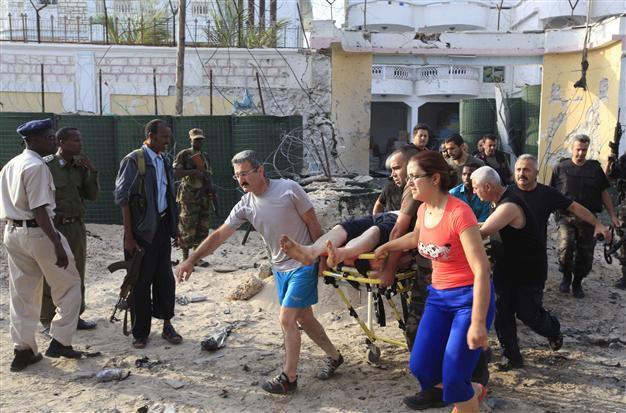Car bomb hits Turkish staff building in Somali capital, killing Turkish special forces agent
MOGADISHU / ISTANBUL

Turkish embassy staff carry their wounded colleague on a stretcher after a suicide car bomb attack at the gates of an office housing the Turkish embassy staff in Somalia's capital Mogadishu, July 27. REUTERS photo
Four Turkish security officers who were wounded in a bombing attack on Turkish mission in Somalia arrived today in Ankara by a medically equipped airplane. The plane also carried the body of an officer who was killed in the attack.
A car loaded with explosives rammed into the gates of an office housing Turkish embassy staff in the Somali capital on July 27, killing a Turkish special forces agent.
Turkish Foreign Ministry Spokesman Levent Gümrükçü told Anadolu Agency that two of the three bombers were killed in the attack, while another three Turkish security personnel were injured.
The Foreign Ministry said in a later statement that one of the injured agents was in critical condition.
The Foreign Ministry statement condemned the attack in the "strongest terms possible" as al-Qaeda-linked al-Shabaab rebels claimed responsibility for the bombing.
A Turkish diplomatic source said Turkish guards were able to kill two attackers before a third detonated his vehicle.
"Turkey is very active in Somalia and when you are very active you become a target quite easily," the diplomat told AFP.
"A suicide car bomb targeted a building housing Turkish embassy workers near k4 [Kilometre Four]," police officer Ahmed Mohamud told Reuters from the scene of the blast.
"The car came when another Turkish was going into the building. The car bomb exploded and destroyed the gate," he said.
Foreign Minister Ahmet Davutoğlu called the Turkish envoy to Somalia Kani Torun immediately after the attack.
Davutoğlu send condolences from his Twitter account to the family of the killed Turkish agent. He added that tight security measures prevented more casualties.
Deputy Prime Minister Bekir Bozdağ told reporters that the Somali officials were investigating the deadly bombing. He also said that no group had claimed responsibility of the attack, despite al-Shaabab’s Twitter statement.
The head of the Organization of Islamic Cooperation (OIC) Ekmeleddin İhsanoğlu and Somali President Hassan Sheikh Mohamud also condemned the attack in a statement. “I wish to convey my deepest sympathies to all those injured or affected by the blast, and I offer my sincere condolences to the families of those who lost their lives,” Mohamud said.
Turkey in 2011 launched a major diplomatic, economic and humanitarian push in war-torn Somalia, becoming one of the very few nations to set up an embassy in the capital.
Attack carried out by 'supposed Muslims': Erdoğan It was opened following a visit in August of the same year by Turkish Prime Minister Recep Tayyip Erdoğan, the second major leader to visit post-civil war Mogadishu, a few months after Uganda's Yoweri Museveni.
Turkey has also sought a greater diplomatic role in the region, including brokering dialogue this year between Somalia and Somaliland.
Erdoğan said the attack was carried out by "supposed Muslims."
"They are doing this against our government. Why? Because we are helping our brothers in Mogadishu," Erdoğan said.
Al-Qaeda-linked al-Shabaab rebels claimed responsibility for the attack via Twitter, as they have for previous bombings, including one in mid-July that killed eight civilians.
"Mujahideen forces in Mogadishu have just carried out an operation targeting a group of Turkish diplomats in Hodan district," al-Shabaab said on its Twitter feed.
The United States condemned the attack, saying that Turkey, a NATO ally, had played an important role in helping Somalia emerge from two decades of conflict.
"This cowardly act will not shake our commitment to continue working for the brighter, more democratic and prosperous future the people of Somalia deserve," State Department spokeswoman Jen Psaki said in a statement.
Al-Shabaab was forced out of bases in Mogadishu by Somali and African forces about two years ago, raising hopes of a return to relative security in a city hit by years of turmoil.
